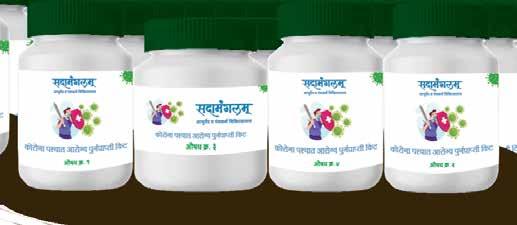
6 minute read
SWASTHAVRTTA - PERSONAL AND SOCIAL RESPONSIBILITIES FOR A HEALTHY WORLD — Dr Srinidhi Dhanya B S and Dr Krithi Amai
SWASTHAVRITTA – PERSONAL AND SOCIAL RESPONSIBILITIES FOR A HEALTHY WORLD
Dharma, Artha, Kama and Moksha are called as Purushartha Chatushtaya. Health is the driving force to achieve the Purushartha Chatushtaya. Ayurveda came into existence on earth with two primary mottos, maintaining the health of a healthy person and to cure the disease of diseased one. Swasthavritta deals with the first major part of Ayurveda of preventing disease, maintaining and promoting the health.
Advertisement
Presence of balanced state of Dosha, Dhatu, Agni, Mala is considered as Swasthya and the person who possesses these is called Swastha Purusha. lenks’k% lekfXuÜp le/kkrqeyfØ;%A izlékResfUnz;euk% LoLFk bR;fHk/kh;rsAA (lq. lw.15/41) The assessment of proper maintenance of Dosha, Dhatu, Agni, Mala is not so easy as they are not measurable. Hence one should be keen on observing the Prasannata of Atma, Indriya and Manas as they are the indicators of happenings inside the body.
How does the imbalance occur in Dosha, Dhatu, Mala?
Until and unless we know about the causes for the imbalance of these factors or disease manifestation it is not possible to maintain the health. Disease is nothing but the imbalance of internal factors of Shareera like Dosha /Dhatu (Abhyantara Hetu), which is again influenced by the external factors like food and life style (Bahya Hetu).
Tridosha (Vata, Pitta and Kapha) are considered as main pillars of body whereas Ahara, Nidra and Brahmacharya are considered as supporting pillars. Hence any hitch in these supporting pillars will shake the balance of Tridosha and lead to disease manifestation.
Importance of Ahara in Health Maintenance
In order to maintain the balance of Tridosha, it is important for an individual to consume balanced diet throughout his life. Careful selection of food items belonging to various food categories (Ahara Varga) is essential to meet the energy requirements and the requirements of macronutrients and micronutrients.
The selection of food items is also influenced by few other factors like Prakriti (basic quality of food), Karana (resultant quality of food processing), Samyoga (different combinations), Rashi (Total quantity and proportion of individual component of meal), Desha (place of origin and consumption), Kala (seasonal food), Upayoktr (personalized selection) and Upayoga Samstha (guidelines for food intake).
Food consumed should be fresh and warm, added with little amount of ghee/oil, including all 6 Rasa (sweet, sour, salt, pungent, bitter, astringent) with predominance of sweet taste. One should consume food only after digestion of previous food and quantity should support easy digestion within 3 to 6 hours.
Importance of Nidra in Health Maintenance
When body and mind is tired of various activities throughout the day, the body demands rest in the form of sleep. Natural sound sleep nourishes and strengthens the body, rejuvenates and promotes health. Improper sleep patterns like day sleep, excessive sleep and reduced sleep can result in imbalance of Dosha. Abhyanga (application of oil to whole body), taking bath, intake of rice with curds, intake of milk, meat soups, application of cooling Lepa on scalp, pleasant state of mind are few factors which help to impart sound sleep. Disturbed state of mind such as fear, stress, anxiety and anger, tired body due to excess exercise, fasting, uncomfortable bed are some of the factors responsible for insomnia or disturbed sleep.
Importance of Lifestyle in Health Maintenance
The state of Dosha fluctuates during different phase of the day & night, and also in accordance with seasonal variations. To combat these fluctuations Ayurveda has specified some regimen to be followed daily (Dinacharya) and seasonally (Ritucharya). Apart from these, timely attending natural urges such as faeces, urine, hunger, thirst etc influence the health.
Routine of an individual starts with waking up in Brahma Muhurta (early morning in between 45 to 90 minutes before sunrise), the most suitable time to keep the mind calm and enthusiastic throughout the day. It is followed by regimens like Dantadhavana (brushing), Jihva Nirlekhana (scraping tongue), Snana (bath), wearing clean cloths etc for maintaining personal hygiene. Certain regimens such as Anjana (applying collyrium), Nasya (instilling medicated oil to nostrils), Dhoomapana (inhaling medicated fumes), Abhyanga (application of oil to whole body), Karnapoorana (instilling medicated oil into ears), Kavala-Gandusha (gargling medicated decoctions or oil) are aimed at strengthening the sensory organs. Daily regular exercise is also essential to strengthen the body and keep an individual active.
Environmental changes according to the seasons are also having influence on the health. Food and activities (seasonal regimen) should be adopted to overcome these changes and influences. For example, consumption of liquid predominant diet in summer to overcome dehydration caused by excessive heat, wearing thick woollen cloth in winter to maintain body temperature etc. Regimen of the upcoming season should be gradually adopted. Sudden Shift in the regimen may end up in health issues. Seasonal purificatory procedures are explained like Basti Karma in rainy season, Virechana Karma in autumn and Vamana Karma in spring to pacify aggravated Vata, Pitta and Kapha Dosha respectively.
Flatus & Faeces are the by-products/ end-products of digestion which are to be attended on time. Regular suppression of urges may end up in health problems like heaviness of the body, indigestion, constipation, headache, body ache etc. Suppression of Urine may end up in hampering the urinary system causing urinary calculi, pain in urinary bladder, groins etc and
also body ache. Sneezing, coughing and vomiting are the protective primary response for any external stimulant and are not to be suppressed. Hunger, thirst, sleep are the natural physiological demand of the body which are to be fulfilled to remain healthy.
Importance of Mental Stability
Not only Tridosha are mere responsible factors for disease formation but also imbalanced manodosha namely Satva, Rajas and Tamas also contribute causing various diseases. Hence proper management of Manodosha is also important. In this aspect Sadvritta (social and behavioural conducts), Achara Rasayana, Manovega Dharana etc are explained.
Sadvritta emphasizes about speaking truth, showing empathy towards others, helping needy people, being calm, avoiding sinful activities, respecting elders etc which also open a healthy atmosphere for communication with the society. It also emphasizes the social responsibilities like covering mouth while coughing, sneezing, keeping distance with the people who are having communicable disease etc. Swasthavritta also emphasizes the control over certain feelings like being greedy, jealous, enmity, intolerance to others good works, excessive desires etc.
Keeping self fit and fine in different aspects like physical, mental and social planes also satisfy the WHO definition of Health as “Health is a state of complete physical, mental and social wellbeing and not merely the absence of disease or infirmity.”
Environmental responsibilities:
Swasthavritta explains about the importance of environmental factors in upholding the health of the society. Causes for environmental pollution, resultant changes in the environment, and their impact on health status as well as measures of management are well described. To keep the air purified, different fumigatory drugs and techniques are explained. Water can be kept pure and drinkable by purificatory procedures like boiling, dipping heated iron ball etc. Measures to enhance the odour and appearance of water are well described. Preventive and protective measures while building house, kitchen, or even in Sutikagara, Kumaragara etc are explained. Measures such as sweeping/wiping, sprinkling medicated water (for sanitizing), smearing cow-dung are described to keep the land clean.
Conclusion:
fuR;a fgrkgkjfogkjlsoh leh{;dkjh fo’k;s’olDr%A nkrk le% lR;ij% {kekokukIrksilsoh p HkoR;jksx%AA (v- â] lw- 4/36) A person who practices wholesome diet and lifestyle regularly, is thoughtful in all his actions, not indulged in sensual pleasure, who is generous, truthful, has forgiving nature and acquaintance with trustworthy people, will remain unaffected by diseases.
With all the details of wholesome diet, lifestyle, mindful actions, social and behavioural conducts, Swasthavritta unveils a complete guide to a contented and healthy life.
Dr Srinidhi Dhanya B S
Assistant Professor, Department of Swasthavritta, Sri Dharmasthala Manjunatheshwara College of Ayurveda and Hospital, Kuthpady, Udupi
Dr Krithi Amai
Assistant Professor, Department of Swasthavritta, Sri Dharmasthala Manjunatheshwara College of Ayurveda and Hospital, Kuthpady, Udupi














